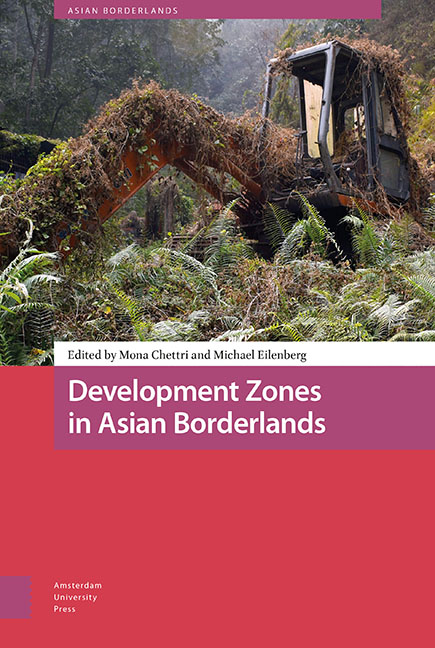Book contents
- Frontmatter
- Contents
- List of Figures and Tables
- Acknowledgements
- Introduction: Enclave Development and Socio-spatial Transformations in Asian Borderlands
- 1 Post-disaster Development Zones and Dry Ports as Geopolitical Infrastructures in Nepal
- 2 Onwards and Upwards: Aerial Development Zones in Nepal
- 3 Casinos as Special Zones: Speculative Development on the Nation’s Edge
- 4 Thinking the Zone: Development, Climate, and Heterodystopia
- 5 From Shangri-La to De facto SEZ: Land Grabs from “Below” in Sikkim, India
- 6 Development Zones in Conflict-Affected Borderlands: The Case of Muse, Northern Shan State, Myanmar
- 7 Smart Enclaves in the Borderland: Digital Obligations in Northeast India
- 8 Post-Disaster Economies at the Margins: Development, Profit, and Insecurities Across Nepal’s Northern Borderlands
- 9 Development from the Margins: Failing Zones and Suspended Development in an Indonesian Border Village
- 10 From Boom to Bust – to Boom Again?: Infrastructural Suspension and the Making of a Development Zone at the China-Laos Borderlands
- 11 Genealogies of Extraction: De Facto Development Zones in the Indonesian Borderlands
- Notes on Contributors
- Index
5 - From Shangri-La to De facto SEZ: Land Grabs from “Below” in Sikkim, India
Published online by Cambridge University Press: 18 June 2021
- Frontmatter
- Contents
- List of Figures and Tables
- Acknowledgements
- Introduction: Enclave Development and Socio-spatial Transformations in Asian Borderlands
- 1 Post-disaster Development Zones and Dry Ports as Geopolitical Infrastructures in Nepal
- 2 Onwards and Upwards: Aerial Development Zones in Nepal
- 3 Casinos as Special Zones: Speculative Development on the Nation’s Edge
- 4 Thinking the Zone: Development, Climate, and Heterodystopia
- 5 From Shangri-La to De facto SEZ: Land Grabs from “Below” in Sikkim, India
- 6 Development Zones in Conflict-Affected Borderlands: The Case of Muse, Northern Shan State, Myanmar
- 7 Smart Enclaves in the Borderland: Digital Obligations in Northeast India
- 8 Post-Disaster Economies at the Margins: Development, Profit, and Insecurities Across Nepal’s Northern Borderlands
- 9 Development from the Margins: Failing Zones and Suspended Development in an Indonesian Border Village
- 10 From Boom to Bust – to Boom Again?: Infrastructural Suspension and the Making of a Development Zone at the China-Laos Borderlands
- 11 Genealogies of Extraction: De Facto Development Zones in the Indonesian Borderlands
- Notes on Contributors
- Index
Summary
Abstract
Sikkim in north-eastern India is a small border state strategically located between China, Nepal, and Bhutan. Two decades of state-led investment in infrastructural development and private investment in hydropower and pharmaceutical industries has transformed Sikkim from a remote border state to a de facto Special Economic Zone (SEZ) where incursions by private capital are masked under state-led development policies. The chapter focuses on Setipool slum, east Sikkim, located near two pharmaceutical factories, to demonstrate how ambiguous land rights and the establishment of pharmaceutical factories have led to spatially contained land booms which replicate nexuses of illegality, claim-making, and exclusions that are characteristic of corporate land grabs. The paper illustrates (i) the liminal origins of development zones, (ii) the networks and, sometimes, unforeseen socio-spatial impacts within and outside development zones, and (iii) the different forms of intimate exclusions that challenge prior assumptions around local responses to corporate incursions.
Keywords: land grabs, slums, Special Economic Zones, Himalaya, pharmaceutical factories
Introduction
The former Himalayan kingdom of Sikkim is strategically located between China, Bhutan, and Nepal. Sikkim's political history has long been dictated by its geographical location as the portal for trans-Himalayan trade, the border between Tibet and colonial India and finally as the border between India and China. Since the merger in 1975, Indian political interest and intervention in Sikkim has been predicated on India's border relations with China. Thus, heavy militarisation of the border is complemented by financial incentives (disproportionate to its size and population) and benevolent industrialisation targeted at ensuring the loyalty of border citizens.
According to the Tibetan Gter Ma (“hidden treasures”) teaching, Sikkim was considered to be a sbas yul (“hidden land”) blessed by Guru Padmasambhava and set apart from the mundane world as a paradise for the practice of Buddhism (see Mullard 2011). Sikkim was the land of medicinal herbs and curative waters, a golden valley where anything sown would grow and where wisdom, kindness, and compassion grew spontaneously within oneself (Balikci 2008, 87). This imagery of the sbas yul, the land of peace, prosperity, and abundance now extends beyond its reference in religious texts and has been purposefully curated by different state governments to position Sikkim as an ideal location for safe and profitable domestic capital investment in north-eastern India.
- Type
- Chapter
- Information
- Development Zones in Asian Borderlands , pp. 117 - 140Publisher: Amsterdam University PressPrint publication year: 2021



